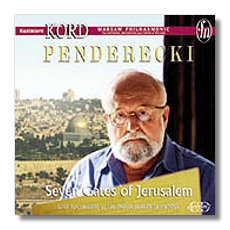
The Internet's Premier Classical Music Source
Related Links
- Penderecki Reviews
- Latest Reviews
- More Reviews
-
By Composer
-
Collections
DVD & Blu-ray
Books
Concert Reviews
Articles/Interviews
Software
Audio
Search Amazon
Recommended Links
Site News
 CD Review
CD Review
Krzysztof Penderecki

Symphony #7 "Seven Gates of Jerusalem"
Bożena Harasimowicz-Haas, Izabella Kłosińska, sopranos
Ewa Podleś, alto
Wiesław Ochman, tenor
Romuald Tesarowicz, bass
Gustaw Holoubek, speaker
Warsaw National Philharmonic Orchestra & Choir/Kazimierz Kord
Accord ACD038a (011332-2) DDD 58:09
Penderecki, who always seems to "think big," wrote this mightily impressive work in response to a commission by the city of Jerusalem, in celebration of the Holy City's three millennia of existence. The world première took place in January 1997 and included choirs from several European cities with the Jerusalem Symphony Orchestra, all conducted by Lorin Maazel. The première recording reviewed here was made two months later in Warsaw at a gala first European performance.
The text is taken mainly from Psalms, and there are brief quotations from Isaiah, Jeremiah, and Daniel, all sung in Latin. The sixth movement (of seven) is an extended passage from Ezekiel describing God's miracle in the valley of bones. This movement is intended to be recited in the vernacular; here, it is in Polish, but in an American performance, it would be recited in English, and so on.
The composer remains vital and active, yet there is an air of continuing to pull various life-strands together in this work. Seven Gates of Jerusalem is no throwback to the heavily experimental works from the first two decades of Penderecki's career; its language might not be Romantic, but its accent is unmistakably so. In the past 15 years, however, Penderecki has seemed to reconcile his avant-garde first period with his reactionary second period. Works such as the Second Violin Concerto do this more seamlessly than Seven Gates of Jerusalem, yet one can't really accuse the latter work of stylistic incongruities. Its scope is so large that the contrasts are welcome and not at all jarring. Listening to this music is like attending a banquet where the seven courses are contrasted yet complementary. Penderecki moves from a cappella mystery to driving rhythms for full orchestra and chorus, and his imagination is at full force throughout. The opening of the work (whose material returns at the end) bears what must be an unintended resemblance to the opening (and end) of Orff's Carmina Burana.
Penderecki hints that Seven Gates of Jerusalem might not yet be in its final version. In an interview reproduced in the booklet, he speaks of adding two more movements, yet reconfiguring the second and fourth movements (both on the text "Si oblitus fuero tui, Jerusalem") to keep the final number of movements at a magical seven.
If a new version appears, a new recording will be welcome. In the meantime, this Polish recording is more than satisfactory. The presence of an audience contributes to the sense of occasion, yet there is not much coughing nor other extraneous noises. The Polish choir lives up to its well-deserved reputation as a passionate and fearless advocate of its countryman's music. The soloists are excellent too; only the bass sounds a little weather-beaten. Part of the pleasure of hearing the Warsaw orchestra is in the unusual instrumentation, which includes a bass trumpet to represent the voice of God, and what Penderecki calls "tubaphones" – plastic pipes of varying lengths whose openings are struck to produce interestingly hollow percussion tones. The engineering is atmospheric, capturing both the overwhelming climaxes and the eerily quiet spaces in between with realism. The thick booklet contains the aforementioned interview, an additional essay, texts and translations, performer biographies, reproduction of Michelangelo's evocations of the prophets in the Sistine Chapel, and more.
Copyright © 2001, Raymond Tuttle



















